On Thursday, August 19, a group of Kabul residents marched through the streets carrying the Afghan tricolour flag and chanting slogans against the Taliban. “Our flag,” they called, “our identity."
The brief presence of Afghan women on the vanguard of the protests was remarkable. The protest fell on Independence Day in Afghanistan, which commemorates the 1919 treaty that ended British rule in the country.
It also happened to coincide with Ashura: the 10th of day of the Shia holy month of Muharram, which marks the killing of Imam Hussein in 680AD. In Afghanistan, however, fewer Shiites than usual took part in religious ceremonies this year under the long shadow of renewed Taliban oppression.
***
After the fall of Kabul, the Taliban raised the white flag of the so-called "Islamic Emirate" over the presidential palace. In parts of the country Taliban fighters have gone door to door, taking lists of names many fear will be used for later reprisal. Along the way they have met with pockets of resistance in civil society, including from some brave women.
Meanwhile Ahmad Massoud, the son of famous anti-Soviet resistance leader Shah Ahmad Massoud, and Afghanistan’s former vice president Amrullah Saleh, are gathering forces in the northeastern province of Panjshir to launch a “second resistance”.
It is currently unclear what the future holds for Afghanistan. Popular resistance seems to be taking shape in some areas, and despite the departure of many Afghans, many have chosen to stay in and stand up to the Taliban's seemingly-unstoppable rise to power.
Afghan journalists and activists have told IranWire that the Taliban’s new official line – that it will be a non-violent governing force that respects people’s rights – is either a sham, or only temporary. One said: "The Taliban is thinking about recognition by the international community, and it’s not clear what will happen after that."
A Tentative Presence at the First Ashura in Occupied Kabul
Apart from the enslavement of women, during its previous reign from 1996 to 2001 the Taliban was also known for – in the words of many – “Shiite genocide”. With its flags now fluttering over Kabul, fewer Shiites than normal took part in events to mark Ashura, the 10th day of Moharram.
Herat and Kabul, Afghanistan's two most populous provinces for Shiites, carried none of the usual vibrancy of Ashura this year. The mourners' tents were smaller and many had neither the courage nor the motivation to hold ceremonies in plain sight of the Taliban. This was the first Ashura in two decades to be held under the banner of the Islamic Emirate.
Taliban spokesperson Zabihollah Mojahed told IranWire earlier this week that the Taliban would ensure the security of Shiite mosques and shrines throughout the country. They could, he said, hold their ceremonies “without worries”.
But many believe this is an attempt at appeasement – and in fact, the Taliban's search for legitimacy from the international community marks only the calm before the storm.
There were no technical obstacles to holding Ashura events this year. Indeed, a number of Taliban members took part in the Kabul ceremony. But observers fear that as the Taliban's power is entrenched, persecution of the Shiites will begin anew.
Mohammad Hossein Karbalaei, a Shiite elder in Kabul's Hazara Dasht-e Barchi area, told IranWire: "People don’t have happy memories of the Taliban, and it’s unclear how they will treat us now. If it weren’t for the Taliban this year, everyone would have come out to mourn."
Tense Atmosphere as Afghan Shiites Fear Privileges Won’t Last
The Shiites of Afghanistan had long accused the former government of not supporting them, so much so that Sirus Alaf, the head of coordination for Shiite Scholars in Afghanistan, had asked people not to fight back against the Taliban. Now, in an interview with IranWire, he called on the Islamic Emirate not to discriminate against Shiites: "This year it’s good that the Taliban allowed Ashura to be celebrated. We ask them to treat the Shiites of Afghanistan well."
Many Afghan Shiites anticipate that the Taliban will impose restrictions on their religious activities in the coming years. One of the attendees at this year's Ashura ceremony told IranWire that the low turnout was due to fear for their lives.
In previous years, many Sunnis also attended Ashura to express their solidarity. But this year, that presence had also waned. "I think the Taliban consider Shiite Afghans to be their enemy," Abdol Wahab, a Sunni Kabul resident who attended Ashura years ago, told IranWire. "Although they were allowed to hold Ashura this year, this doesn’t indicate an improvement in the Taliban’s relationship with the Shiites. I promise you the Taliban won’t allow this ceremony to take place in the city in the years to come."
The Taliban has better relations with Saudi Arabia, regional arch-rival of the Islamic Republic of Iran, and the second country in the world to recognize the Islamic Emirate. Earlier, China had adopted the same stance.
On the other hand, the complexity of the situation in Afghanistan is such that the Islamic Republic is also compelled to support – or at least tolerate – aspects of the Taliban, while the enmity between Iran and Saudi Arabia over Shiites and Sunnis is an issue that manifests itself in proxy wars.
This year, Ashura was held by some more daring Shiites. Elsewhere in Kabul a group raised Afghan flags and shouted against the Taliban before being dispersed. Whatever the future of Afghanistan would be, one thing feels certain: the storm has not yet begun.
This article was written by a citizen journalist under a pseudonym.
Related coverage:
Taliban Assures Iranian Foreign Ministry its Diplomats are Safe
Iran's Interior Ministry: Afghan Refugees Will be Turned Back at the Border
What Treatment Can Fleeing Afghans Expect From Iran?
Warning to Iranian Parliament: The Taliban is Back
Taliban Commander: Iran's Revolutionary Guards Have Our Backs on the Border
visit the accountability section
In this section of Iran Wire, you can contact the officials and launch your campaign for various problems




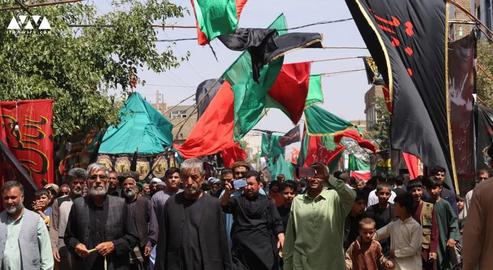

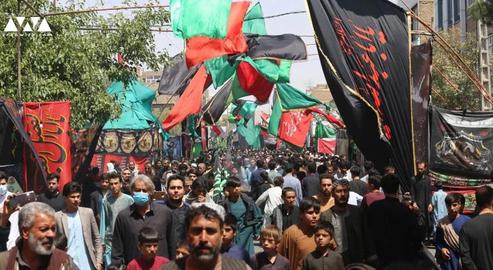
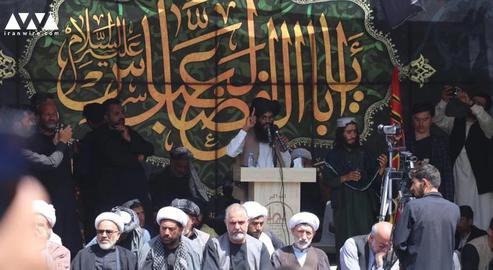
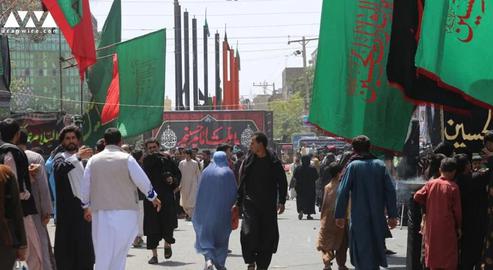



















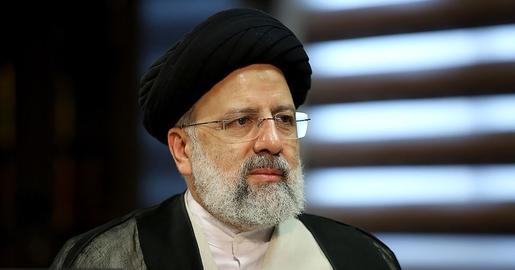
comments